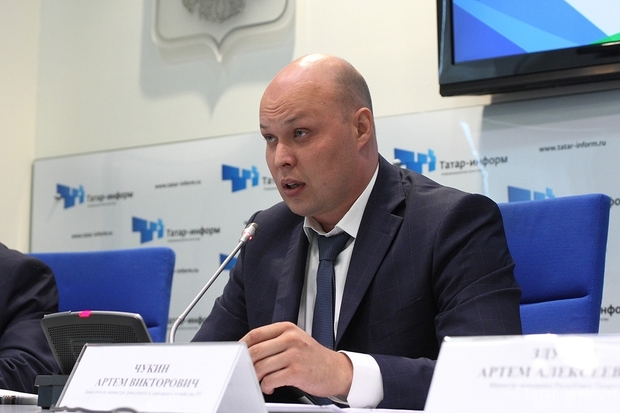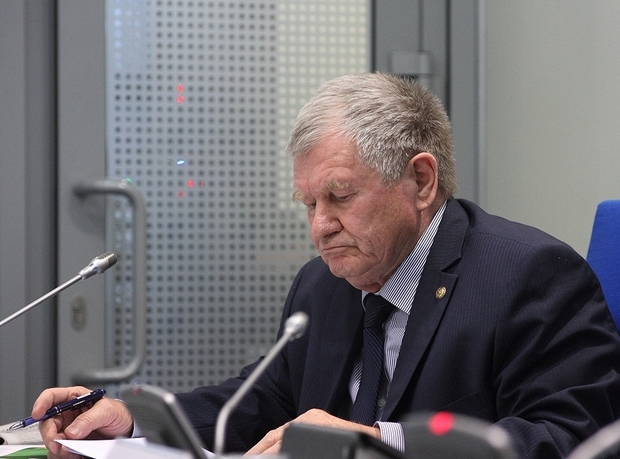Artyom Zdunov: ‘We tell the investors: there definitely will be a road’
Dmitry Medvedev signed a decree on the creation of Innokam and the road map of Kama Innovative Cluster. At the press conference held on 27 June in Tatar-inform, the authorities of Tatarstan told about the first priority projects in which Tatarstan together with the federal authorities will be engaged in 2016-2017. It will be the projects of transport infrastructure. In total, by 2020 Tatarstan with the support of the federal centre intends to implement 79 projects at 750 billion rubles.
State corporations and the Ministries of Russia will take Innokam into account
The Minister of Economy of Tatarstan Artyom Zdunov declared that the adoption of the federal road map of the Kama Innovation Cluster 'has determined the growth point not only of Tatarstan but of the Russian economy'. Innokam, he said, will allow to integrate the sectors of the economy of Tatarstan, the main enterprises that form the gross regional product of RT:
'Why is the document important? Already its preamble refers to the adoption of the action plan for the subsequent execution by the federal government and state corporations, which will have to take the programmes of Innokam into account when forming the budget and state programmes. Tatarstan actively participates in the federal target programmes but the priority participation is important for us in terms of investments and investment cycle. Innokam is already known for its investment projects in the SEZ Alabuga; in Nizhnekamsk — TANECO, TAIF-NK; in Naberezhnye Chelny – the projects of KAMAZ, KIP Master. However, their implementation faces infrastructure limitations on the import of raw materials and the export of finished products. This was the leitmotif of the document creation, which was designed to remove infrastructural limitations. And to ensure the implementation of investment projects in accordance with the Strategy-2030. The document is unique because we are developing it together with the federal authorities.'
How they will develop the KAMAZ project of relay haulage
In other words, Tatarstan counts on the priority budget financing of the programmes of Innokam, which in the light of budget sequestration and the crisis in the Russian economy will allow not to reduce the pace of development of the Tatarstan economy. Thus, the project Innokam, believes Zdunov, not only 'a technological concept' but in accordance with it they will train new specialists (and this concerns, in the first place, the work of Kazan Federal University and Kazan State Technical University), develop the rental housing market (for the living of most specialists) and infrastructure.

In the latter, Tatarstan intends to make the special emphasis on the development of the relay transportation on the basis of the universal chassis Kamatainer. It is promoted by KAMAZ. The project exists since the 1970s, the Director General Sergey Kogogin became interested in it in 2012. As a result, in the framework of the implementation of Kamatainer, there have already been built the centers in Naberezhnye Chelny, Kazan, Cheboksary and Nizhny Novgorod. Artyom Zdunov admitted that such project cannot function only within the Republic. At least because it assumes 'the haul distance at 200 km'. The RT authorities count not only on the optimization of logistics but also on the development of SMEs around auto centres — by the projects of the sites, where will be carried out transshipment of containers in the field service, food etc. Now they are thinking where to locate these sites.
Integration, harmonization and diversification — for 750 billion rubles
Innokam involves a lot of projects for PPP: 'All our investors have found their place there,' admitted Zdunov. It also integrates and synchronizes in the framework of one document the work of all Tatarstan clusters, not only the largest automotive and petrochemical.
'At the level of the Russian government they discuss how to synchronize the work of the SEZ, the territory of advanced development, 25 priority clusters. But the integration and harmonization are successfully implemented in the project Innokam. Besides, we have carefully thought through how to develop industrial sites with SMEs – it is a large zone around our businesses. In addition to the large clusters, we will develop our IT-Park as the anchor of the IT industry. We will develop the wood processing cluster, the cluster of food technology. Why are we doing this? Because these industries will help diversify our mono towns (Naberezhnye Chelny, Nizhnekamsk, Mendeleevsk, Kamskie Polyany). And the support of agricultural, light industry and other clusters will help us in this,' expressed hope the Minister of Economy of RT.

At the moment, the concept of Innokam includes 79 projects at 750 billion rubles. In the future, in the result of annual reports to the government of the Russian Federation, their number may either increase or decrease. The task is to implement the entire project Innokam by 2020 (only 4 years left!).
The road infrastructure of Kama cluster by 2020 will require about 20 billion rubles
The first projects, which the federal centre is ready to finance, will be the road that connects Chelny and Nizhnekamsk, the road M-7 connecting the Kamsky agglomeration with Kazan one; the construction of a bridge across the Kama River. At the press conference, the Deputy Minister of Transport of Tatarstan Artyom Chukin said that in 2015 for the reconstruction of the highway M-7 'Volga' it was allocated 6.5 billion rubles, in 2016 for the reconstruction of 'six sections of the route yet', it was allocated less — 2.6 billion rubles. The length of the road, reconstruction of which it is needed to finance until 2019, is 84 km. As a result, the highway M-7 can be transferred in 'the first technical category', suggesting 'two lanes in each direction that will enhance the loading capacity of the road'.
'Another project is the reconstruction of the airport Begishevo,' said Artyom Chukin, 'for the realization of which the trilateral agreement was signed, the appointed contractor — Kamdorstroy, with which we signed a contract at 783 million rubles. In 2017 we are planning to receive 132 million rubles more [from the federal centre]. The railway projects, particularly the construction of the path to Zainsk (the object is in the stage of completion, will be launched in November) are being implemented now.'

One of the largest investment projects, about which they have been talking in recent years, is also included in the programme of Innokam — it is the construction of a new bridge across the Kama river near the Sokolki village. The cost of a bridge, excluding the construction of driveways thereto, is 15-16 billion rubles. The implementation period — 5 years. The government of RT has already worked out, according to Chukin, a feasibility study of the project and now they are choosing a business model (they are several).
'Alas, there is no methodology at the federal level yet for the allocation of interbudgetary transfers on PPP projects,' expressed regret the Deputy Prime Minister. 'As soon as the methodology appears, we will work out the implementation of the project in stages. Separately — the construction of the bridge, then the construction of driveways, due to which the hauliers will have an opportunity to reach directly the productions sites of Nizhnekamsk from Mamadysh through the bridge and come out to the road to Naberezhnye Chelny. All infrastructure projects of Innokam, excluding the bridge, requires 3.5 million rubles.'
'We tell the investors: 'Here, the road definitely will be, here is the line in the budget...'
The project Innokam (not counting, of course, the residents of the territory of advanced development and SEZ) does not involve special benefits for its residents and investors. Zdunov noted that 'as the benefit can be considered the possibility of access to the infrastructure.'
'As well as we worked on industrial parks! Investors appear immediately, as soon as we say that all the issues of grid connection, roads will be solved. We tell the investors: 'Here the road definitely will be, here is the line in the budget...' explained Zdunov.
On the question of Realnoe Vremya whether Zdunov and his colleagues have concerns that during the crisis they will have problems with federal financing, the Economy Minister said:
'No concerns, we are always ready! For example, in the small business there was a huge budget sequestration. With the support of Deputy Prime Minister Igor Shuvalov it was established a working group, as a result the funding of the programme of SMEs support was increased and brought up to the level of 2012-2013! That is, more than 20 billion rubles. We are ready to any decisions [federal]. If we have budget constraints, we try to ensure the inclusion of priority projects in the state programmes. This also applies to the territory of advanced development and Innokam. In order Tatarstan was a priority!'

Answering the question of Realnoe Vremya about the intention to attract foreign investors, Zdunov referred to the experience of JV KAMAZ, Alabuga and the territory of advanced development:
'For example, after entering the territory of advanced development of the Chinese company Haier many Chinese companies started to come and watch the sites of KIP Master and other industrial parks. If one enters, trust appears!'
'What is the price of oil today? 49? Before the referendum in London it was 52! God forbid what will happen tomorrow — it will drop to 30!'
The supervisor of the project Rafinat Yarullin, the chairman of the nonprofit partnership Innokam, tried to prove the advantages of Innokam, referring to the possible future independence of Tatarstan and Russia from oil prices.
'What is the price of oil today? 49 [dollars per barrel]? Before the referendum in London (on leaving the EU — editor's note) it was 52! God forbid what will happen tomorrow — it will drop to 30! Is it possible? It is! But when there is processing, good materials that can be sold, nobody cares about the price of oil. Anyway, on those, who have the processing of oil, it has no effect,' believes Yarullin.
He also noted that the implementation of large petrochemical projects by Tatneft and Nizhnekamskneftekhim will allow to create a huge number of small businesses. And he cited an example of the enterprise in the SEZ Alabuga when they were discussing what would happen with the sale of optical fiber. Initially, they built the production for 21 thousand tonnes. However, after 1.5-2 years 'all products were sold out' — 'now we need production for 50 thousand tonnes'. The SME got involved in the sphere of production of glass fiber and its consumers.
'The only drawback: the market's right hand – the banks – work poorly!'
'The only drawback: the market's right hand – the banks – work poorly!' noted Yarullin. 'We have a lot of people who know how to make products. We also had difficulties in producing polycarbonate at Orgsintez during the first years, but now we do not have enough capacities!'

Among the key projects that are significant for Innokam Yarullin cited the project TAIF-NK on the deep processing of heavy oil residues (by the way, among the workers there are also the Turks), they intend to launch it by the end of the year, and the project TANECO of the processing of cokes that the authorities are willing to fully realize by 2017.
'The same is true for ethylene. We have been in Korea recently: a small country where there is no a single gram of oil. And they process 250 varieties of oil! They buy from everyone: Qatar, Indonesia… We desperately need the ethylene complex, and within the cluster it is planned the funding at 191 billion rubles,' said Yarullin.
The main task of the management company Innokam Rafinat Yarullin sees in the establishment of 'horizontal linkages' between existing small and medium-sized enterprises operating around the giants. So, during his last visit he was surprised by the number of small enterprises in Naberezhnye Chelny, about which he 'had no idea'. Now in Innokam there are about 300 residents.